大学英语知识点.
大学英语基础知识点大一

大学英语基础知识点大一大学英语对于大一新生来说是一个重要的学科,它涵盖了基本的英语语法、词汇、阅读、听力和写作技巧。
本文将介绍一些大学英语基础知识点,帮助大一新生更好地应对这门学科。
一、英语语法英语语法是英语学习的基础,以下是一些重要的语法知识点:1. 时态:英语有多种时态,如一般现在时、过去时、将来时等。
掌握各种时态的用法和构成对于正确运用英语至关重要。
2. 语态:英语有主动语态和被动语态两种形式。
学生需了解被动语态的构成和使用场景。
3. 从句:学习掌握名词性从句、定语从句和状语从句等不同类型的从句,并能正确使用它们。
二、英语词汇扩大词汇量是提高英语水平的关键。
以下是一些建议:1. 单词记忆:利用词卡、手机应用等工具,记忆常用单词的拼写、发音和意义。
2. 词根词缀:学习一些常用的词根和词缀,可以帮助理解和记忆更多的单词。
3. 同义词和反义词:了解词汇的近义词和反义词,可以帮助丰富表达方式。
三、英语阅读阅读是提高英语综合能力的重要途径。
以下是一些提高英语阅读能力的方法:1. 阅读量:多读英语文章,包括新闻、故事、杂志等。
逐渐提高阅读难度,培养阅读理解能力。
2. 阅读技巧:学习使用略读、扫读、精读等不同的阅读技巧,提高阅读速度和理解力。
3. 生词学习:遇到不认识的生词时,学会通过上下文猜测词义,不必查字典。
四、英语听力听力是英语学习中的一项重要技能,以下是一些建议:1. 多听英语材料:如英语音乐、电影、电视剧和英语教材中的录音等。
通过多听,提高对英语语音、语调和表达方式的理解。
2. 留意听力材料的难度:初学阶段,选择适合自己的听力材料,逐渐增加难度。
3. 笔记记录:听英语材料时,可以同时记录重要的信息,以便后续复习和理解。
五、英语写作写作是对英语学习成果的输出,以下是一些写作技巧:1. 句型和连词的使用:学习一些常用的句型和连接词,使文章结构更加清晰和紧凑。
2. 逻辑思维:构思文章时,要注意逻辑关系和段落间的过渡,使文章条理清晰。
大学英语知识点总结

Unit 1 The Dinner Party1. shortly before WW1 一战前不久2. track down 追溯,追查3. be seated 就座4. spring up 突然出现,开始5. outgrow the jumping-on-a-chair-at the sight of a mouse era 不再像过去那样见到老鼠就跳到椅子上6. That last ounce of self-control is what really counts.这多出来的一点自制力才是真正起作用的。
7. motion to sb 向某人示意signal to sb 8. whisper sth to sb 向某人嘀咕,耳语9. the America comes to with a start. 这个美国博物学家突然醒悟了.Startle-----startle10. bait for a snake 蛇的诱饵11. an empty room 一个空房子a bare marble floor 没铺地毯的大理石地板barely any hair====hardly/scarcely any hair 12. serve the next course 上下一道菜a course of dish 一道菜13. frighten sb into doing sth 吓得某人去做…persuade sb into doing sthtalk sb into doing sth threaten sb into doing sth14. out of the corner of his eyes 从他的眼角里15. Stare straight ahead 盯着往前看16. Not move a muscle 纹丝不动17. Make for 前往 out19. Slam the door shut20. Exclaim21. at the sight of 一看见at the thought of 一想起22. a heated/spirited discussion 一场激烈的争论22. an example of perfect self-control 一个镇定自若的典范23. A faint smile lig hts up the hostess’s spots of color brightened her strange expression came over her face.24. a colonial official 一个殖民地官员25. give a large dinner party 办一个盛大的晚宴26. a visiting American naturalist 美国访问博物学家27. a spacious dining room 宽敞的餐厅28. the major 少校 the colonel29. feel like doing sth 想要/喜欢做某事30. commotion 混乱,骚动31. The tone of his voice is so commanding that it silences everyone. 他的语调很威严,让每个人都静下来不出声.32. count three hundred 数三百下count up to three hundred 数到第三百下33. sit like stone images 像石雕一样坐着Sit rootedUnit 2 Lessons from Jeffersonbe of interest/important 很有趣/很重要obtain knowledge from many sources从许多源头获取知识personal investigation 个人调查appoint him to a committee 派他去一个委员会study papers on the subject 研究该课题的文件make on-the-spot observations 做现场观察By birth and by education Jefferson belonged to the highest social class.无论是论出身还是论教育,杰弗逊都属于最高的社会阶层.noble persons 贵族persons of noble origins 出身高贵的人persons of humble origins 出身卑微的人go out of one’s way to do sth 特意/专门去做某事a cooking pot 做饭的锅If you will only do this, you may find out why people are dissatisfied. 如果也只有你愿意这样做,你才可能发现为什么人民不满意.Heaven has given you a mind for judging truth and error. Use it.上帝赋予你一个判断正确和错误的头脑,就运用它吧.form a correct judgment 形成正确的判断not hesitate a moment to do sth 毫不犹豫地去做某事the former and the latter 前者和后者In a free country, there will always be conflicting ideas, and this is a source of strength.在一个自由的国度,总会有冲突的意见,而这正是力量的源泉.It is conflict and not unquestioning agreement that keeps freedom alive.让自由保持活力的是冲突而不是绝对的一致.There are two sides to every question. If you take one side with effect, those who take the other side will of course resent your actions.每个问题都有两面.如果你有力地站在一方,那么另一方的人必定会憎恨你的行动.be chained to customs 受习俗的禁锢lose its usefulness 失去它的效用No society can make a perpetual constitution, or even a perpetual law. 任何一个社会都不能制定出永久的宪法或永久的法律.He didn’t fear new ideas, nor did he fear the future.他不惧怕新观点,也不惧怕未来.I steer my ship with hope, leaving fear behind.我满怀希望驾驶着帆船,把恐惧抛在身后.be based on knowledge 以知识为基石men of his age===peer 同龄人practice crop rotation and soil conservation 施行作物轮作和土壤保持standard practice 标准的做法be superior to any other in existence 比现存的任何做法都优越be inferior to 不如…Of all Jefferson’s many talents, one is central.在杰弗逊的诸多才能中,其中一个是重要的.He was above all a good and tireless writer.首先,他是个优秀的不知疲倦的作家.Ageless-----parentless-----timeless31. complete works 全集32. when the time came to do sth当该做…的时候33. the task of writing it was his. 撰写的任务都落在他的肩头了.34. We hold those truths to be self-evident, that all men are created equal.]我们坚信这些不言而喻的事实:人人生而平等.Every is born equal.35. He left his countrymen a rich legacy of ideas and examples.他给他的同胞留下一笔丰富的思想遗产和范例.36. owe a great debt to 归功于…. ====Be indebted to37. Only a nation of educated people could remain free. 只有一个由受教育的人民组成的国度才能保持自由.Unit 3 My First Jobapply for a teaching job 申请一份教学工作go from bad to worse 每况愈下enter university 进入大学in a suburb of London 在伦敦的郊区be very short of money 手头很紧Without a degree and with no experience in teaching, my chances of getting this job were slim. 一无学历,二无教学经历,我得到可能性是微乎其微.Chances of doing are/were……做某事的机会是……It proved an awkward journey. 这一路原来真是麻烦。
大学英语知识点总结归纳

大学英语知识点总结归纳一、语法知识点1. 英语句子的基本构成英语句子的基本构成包括主语、谓语、宾语等,根据不同的语法成分可以分为简单句、并列句、复合句等多种形式。
掌握句子的基本构成对于语言的准确表达和理解至关重要。
2. 时态英语中的时态包括一般现在时、一般过去时、一般将来时、现在进行时、过去进行时、现在完成时、过去完成时等。
时态的正确使用可以使语言表达准确清晰。
3. 语态英语中的语态包括主动语态和被动语态,正确使用语态可以使表达更加灵活多样。
4. 语气英语中的语气包括陈述语气、疑问语气、祈使语气等,每种语气的使用都有其特定的情境和表达方式。
5. 并列连词和从属连词并列连词用于连接并列结构的词、短语、从句等,包括and、or、but等;从属连词用于连接主从复合句,包括because、when、although等。
6. 形容词和副词的比较级和最高级形容词和副词的比较级和最高级形式可以用于比较不同事物的程度和大小。
7. 定冠词和不定冠词定冠词包括the,不定冠词包括a和an,使用时需要根据名词的情境和特点正确选择。
8. 代词代词分为人称代词、物主代词、反身代词、指示代词等,根据情境需要选择正确的代词形式。
9. 主谓一致主谓一致是指主语和谓语在人称和数上保持一致,是英语句子中的重要语法规则。
10. 介词介词用于连接名词、代词、动词或形容词等,构成介词短语用于修饰其他成分,掌握介词的使用可以使语言表达更加丰富。
二、词汇知识点1. 单词的拼写和发音掌握英语单词的拼写和发音是学习英语的基本功,有助于提高语言表达的准确性。
2. 同义词和反义词同义词和反义词可以丰富语言表达的方式,帮助学习者避免重复使用相同的词汇。
3. 词汇搭配词汇搭配是指在语言表达中,词语之间常常有固定的搭配关系,如动词搭配介词、名词搭配形容词等,掌握词汇搭配可以使表达更加自然流畅。
4. 词义辨析英语中存在大量近义词和异义词,学习者需要掌握它们的区别和正确用法,避免混淆。
大学英语期末知识点大一

大学英语期末知识点大一大学英语是大一学生必修的一门课程,它的内容丰富多样,包括英语单词、语法、阅读理解、听力和口语等方面的知识。
下面将针对大学英语期末考试的几个重要知识点进行详细介绍。
一、英语单词掌握一定量的英语词汇是理解和应用英语语言的基础。
在期末考试中,通常会涉及词汇选择、词义辨析以及填空等题型。
为了提高词汇量,我们可以通过背单词卡片、词汇书以及在线词汇学习工具来进行学习。
此外,利用单词在句子中的实际运用场景,可以加深对单词的记忆。
二、语法知识掌握英语语法是理解和构建正确句子的基础。
在期末考试中,语法知识主要体现在填空、改错和翻译等题型中。
常见的语法知识点包括时态、语态、虚拟语气、从句和介词等。
我们可以通过阅读语法书籍、练习语法题以及做语法习题来加强对语法知识的掌握。
三、阅读理解阅读理解是大学英语考试的重要组成部分。
在期末考试中,通常会涉及短文的理解、主旨概括、细节把握以及文章写作意图等方面的题目。
为了提高阅读理解能力,我们可以多读英语文章,培养阅读习惯和速度,并学会使用扫读和略读等阅读技巧。
四、听力听力是大学英语考试的另一个重要部分。
期末考试中,听力部分通常包括听对话、听短文和听长对话等。
要提高听力能力,我们可以多听英语材料,如英语歌曲、电影、英语广播等,锻炼自己的听力理解能力。
同时,可以通过做听力练习题和模拟考试,提高对于听力材料的理解和把握。
五、口语口语是英语学习的重要环节之一。
在期末考试中,通常会有口语考试的部分。
为了提高口语表达能力,我们可以多与他人进行英语对话,加入英语角或者组织口语交流活动。
此外,可以模仿英语原声录音或者参加英语口语培训班,提高自己的发音和口语表达能力。
总结起来,大学英语期末考试的知识点主要包括英语单词、语法、阅读理解、听力和口语。
要想在考试中取得好成绩,我们需要通过积极学习相关知识,掌握相关技巧,并进行充分的练习和训练。
只有融会贯通,才能在大学英语的学习中取得好成绩。
大学大一英语知识点
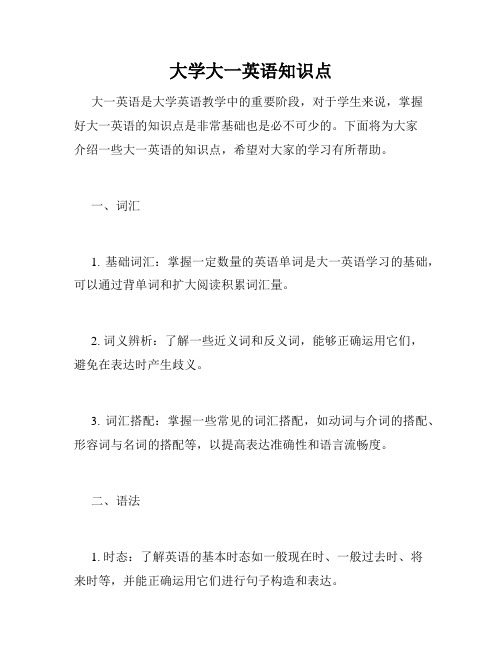
大学大一英语知识点大一英语是大学英语教学中的重要阶段,对于学生来说,掌握好大一英语的知识点是非常基础也是必不可少的。
下面将为大家介绍一些大一英语的知识点,希望对大家的学习有所帮助。
一、词汇1. 基础词汇:掌握一定数量的英语单词是大一英语学习的基础,可以通过背单词和扩大阅读积累词汇量。
2. 词义辨析:了解一些近义词和反义词,能够正确运用它们,避免在表达时产生歧义。
3. 词汇搭配:掌握一些常见的词汇搭配,如动词与介词的搭配、形容词与名词的搭配等,以提高表达准确性和语言流畅度。
二、语法1. 时态:了解英语的基本时态如一般现在时、一般过去时、将来时等,并能正确运用它们进行句子构造和表达。
2. 语态:理解被动语态和主动语态的区别,能够正确运用被动语态进行句子转换和表达。
3. 从句:了解主从复合句的概念,并能正确使用连接词如“that”、“if”、“when”等引导从句。
4. 名词性从句:了解名词性从句的概念和用法,如主语从句、宾语从句、表语从句等。
5. 倒装句:了解倒装句的用法和形式,能够正确运用倒装句进行表达。
三、阅读理解1. 阅读技巧:培养良好的阅读习惯,如快速浏览文章、提前预测答案等,以提高阅读效率和准确性。
2. 理解文章:能够通过阅读理解文章的主旨、段落大意和细节信息,掌握文章的整体含义。
3. 词义推测:通过上下文的提示,准确推测生词和短语的词义,提高阅读理解的准确性和速度。
四、写作技巧1. 句子结构:掌握正确的句子结构,如主谓宾结构、并列句、复合句等,以提高写作的连贯性和准确性。
2. 篇章结构:理解文章的篇章结构,如开头、中间段落和结尾的组织,能够合理组织文章内容。
3. 连词使用:正确使用连词如“and”、“but”、“so”等,使句子之间的逻辑关系更清晰。
4. 写作表达:能够用合适的词汇和句子结构表达自己的观点和意见,提高写作的流畅性和准确性。
五、口语表达1. 口语技巧:提高口语表达的流畅性和连贯性,如正确运用衔接词、使用固定搭配等。
大一英语综合教程1知识点

大一英语综合教程1知识点大一英语综合教程1是大学英语课程中的核心教材之一,通过学习这门课程,学生们可以掌握英语基础知识,提高听说读写能力。
本文将介绍大一英语综合教程1中的重要知识点,包括词汇、语法、听力和阅读等方面。
一、词汇知识点1. 同义词:在学习词汇时,我们需要注意一些常见的同义词。
例如,happy和glad都表示“快乐”的意思,但在使用时有一些细微区别。
('glad' usually suggests a temporary happiness about a particular event, whereas 'happy' suggests a general sense of well-being or contentment.)2. 前缀和后缀:掌握常用的前缀和后缀可以帮助我们更好地识别单词的词义。
例如,dis-表示否定,un-也表示否定,如dislike和unhappy。
二、语法知识点1. 时态:时态是英语语法中的重要概念,包括一般现在时、一般过去时、一般将来时等。
掌握各种时态的用法是进行有效语言交流的关键之一。
2. 从句:从句是一个句子中的一部分,可以作为名词、形容词或副词的一个补充。
了解从句的类型和使用方法有助于提高阅读和写作的能力。
三、听力知识点1. 听力技巧:在进行听力理解时,我们需要掌握一些有效的技巧。
例如,注意关键词、听清说话人的语调和语速以及根据上下文推断出正确答案等。
2. 笔记记法:在听力过程中,我们可以采用不同的记笔记方法来帮助我们更好地理解和记忆所听到的内容。
例如,可以使用简化的符号或图标来记录主要信息。
四、阅读知识点1. 阅读技巧:提高阅读能力的关键在于掌握一些有效的技巧,如快速浏览文章、注意关键词、遇到生词时运用上下文推测词义等。
2. 阅读理解题型:了解不同类型的阅读理解题型及其解题方法对于提高阅读能力和应试能力都是非常重要的。
大学必备英语知识点总结

大学必备英语知识点总结1. Grammar Rules:a. Parts of Speech: Understanding the basic parts of speech in English, including nouns, pronouns, verbs, adjectives, adverbs, prepositions, conjunctions, and interjections. It is crucial to know how each part of speech functions within a sentence and how they relate to one another.b. Sentence Structure: Knowing how to construct and analyze different types of sentences, such as simple, compound, complex, and compound-complex sentences. Understanding subject-verb agreement, parallelism, and proper punctuation is also essential for constructing grammatically correct sentences.c. Verb Tenses: Mastery of verb tenses, including present, past, and future tenses, as well as perfect and progressive forms of each. Understanding when and how to use each tense is vital for effective communication.d. Articles and Determiners: Knowing the rules for using articles (a, an, the) and determiners (this, that, these, those) to modify nouns and provide context within a sentence.e. Modifiers and Phrases: Understanding how to use modifiers (adjectives and adverbs) to add detail and description to sentences, as well as recognizing different types of phrases (prepositional, gerund, infinitive) and how to use them effectively.2. Vocabulary:a. Word Roots, Prefixes, and Suffixes: Understanding the meaning and usage of common word roots, prefixes, and suffixes can help expand vocabulary and decipher the meanings of unfamiliar words.b. Synonyms and Antonyms: Learning synonyms (words with similar meanings) and antonyms (words with opposite meanings) can help students express themselves more accurately and effectively.c. Idioms and Phrasal Verbs: Familiarizing oneself with common idiomatic expressions and phrasal verbs can enhance fluency and comprehension in spoken and written English.d. Academic Vocabulary: Developing a strong grasp of academic vocabulary related to specific fields of study is essential for success in college coursework.e. Contextual Understanding: Learning to infer the meaning of unfamiliar words based on context clues and familiar word parts is a valuable skill for expanding vocabulary.3. Communication Skills:a. Reading Comprehension: Developing the ability to comprehend and analyze written texts, including recognizing main ideas, supporting details, and inferences, as well as evaluating the credibility and relevance of sources.b. Writing Skills: Mastering the process of writing, including prewriting (planning and organizing ideas), drafting, revising, editing, and proofreading, as well as understanding different types of essays (narrative, descriptive, expository, persuasive, and argumentative).c. Speaking and Listening: Improving oral communication skills, including public speaking, active listening, and effective interpersonal communication, is essential for success in both academic and professional settings.d. Critical Thinking: Developing the ability to think critically, analyze information, and make logical, evidence-based arguments is crucial for success in college-level academic writing and discourse.e. Research Skills: Understanding how to conduct research, evaluate sources, and cite information ethically and accurately is essential for academic integrity and success in college coursework.In summary, college students should strive to master essential grammar rules, expand their vocabulary, and develop effective communication skills in order to succeed academically and professionally in English-speaking environments. This knowledge and these skills will open doors to opportunities for personal and intellectual growth, as well as future career success.。
大学英语知识点
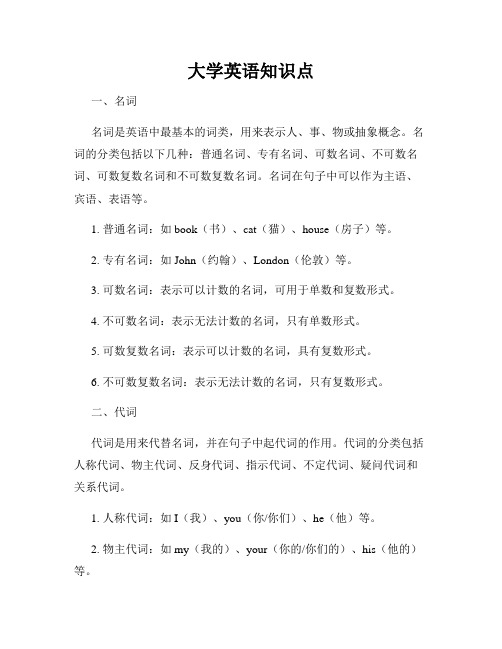
大学英语知识点一、名词名词是英语中最基本的词类,用来表示人、事、物或抽象概念。
名词的分类包括以下几种:普通名词、专有名词、可数名词、不可数名词、可数复数名词和不可数复数名词。
名词在句子中可以作为主语、宾语、表语等。
1. 普通名词:如book(书)、cat(猫)、house(房子)等。
2. 专有名词:如John(约翰)、London(伦敦)等。
3. 可数名词:表示可以计数的名词,可用于单数和复数形式。
4. 不可数名词:表示无法计数的名词,只有单数形式。
5. 可数复数名词:表示可以计数的名词,具有复数形式。
6. 不可数复数名词:表示无法计数的名词,只有复数形式。
二、代词代词是用来代替名词,并在句子中起代词的作用。
代词的分类包括人称代词、物主代词、反身代词、指示代词、不定代词、疑问代词和关系代词。
1. 人称代词:如I(我)、you(你/你们)、he(他)等。
2. 物主代词:如my(我的)、your(你的/你们的)、his(他的)等。
3. 反身代词:如myself(我自己)、yourself(你自己/你们自己)、himself(他自己)等。
4. 指示代词:如this(这)、that(那)、these(这些)等。
5. 不定代词:如somebody(某人)、anybody(任何人)、something(某物)等。
6. 疑问代词:如who(谁)、what(什么)、which(哪个)等。
7. 关系代词:如who(谁)、which(哪个)、that(那个)等。
三、动词动词是表示行为或状态的词类。
动词根据时态、语态和情态的不同,可以有不同的形式。
1. 时态:英语中常见的时态有一般现在时、一般过去时、一般将来时等。
2. 语态:英语中常见的语态有主动语态和被动语态。
3. 情态动词:表示说话人对某种动作或状态的一种态度或看法,如can(能)、should(应该)、must(必须)等。
四、形容词形容词是用来形容名词的词类,用于修饰名词或代词。
大一大学英语知识点

大一大学英语知识点一、词汇与语法1. Parts of Speech (词性)- Noun (名词): 表示人、物、地点、概念等。
- Pronoun (代词): 替代名词,包括人称代词、物主代词等。
- Verb (动词): 表示动作、状态或存在。
- Adjective (形容词): 修饰名词或代词。
- Adverb (副词): 修饰动词、形容词或其他副词。
- Preposition (介词): 表示方位、时间、原因等关系。
- Conjunction (连词): 连接短语、词或句子。
- Interjection (感叹词): 表示强烈情感或感叹。
2. Tenses (时态)- Simple Present Tense (一般现在时): 描述当前状态或习惯性动作。
- Present Continuous Tense (现在进行时): 描述正在进行的动作。
- Simple Past Tense (一般过去时): 描述已经发生的过去事件。
- Past Continuous Tense (过去进行时): 描述过去某个时间段正在进行的动作。
- Simple Future Tense (一般将来时): 描述将来会发生的事件。
- Future Continuous Tense (将来进行时): 描述将来某个时间段正在进行的动作。
3. Sentence Structure (句子结构)- Subject + Verb + Object (主+谓+宾): 基本句子结构。
- Subject + Verb (主+谓): 无宾语的句子结构。
- Subject + Verb + Complement (主+谓+补语): 表示状态或特征。
- Subject + Verb + Indirect Object + Direct Object (主+谓+间接宾+直接宾): 表示动作的接收者。
4. Conditional Sentences (条件句)- Zero Conditional (零条件句): 表示真实情况。
大学英语知识点大一
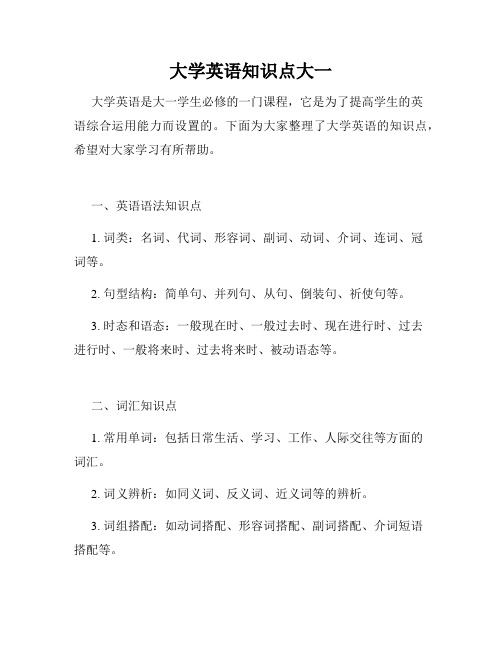
大学英语知识点大一大学英语是大一学生必修的一门课程,它是为了提高学生的英语综合运用能力而设置的。
下面为大家整理了大学英语的知识点,希望对大家学习有所帮助。
一、英语语法知识点1. 词类:名词、代词、形容词、副词、动词、介词、连词、冠词等。
2. 句型结构:简单句、并列句、从句、倒装句、祈使句等。
3. 时态和语态:一般现在时、一般过去时、现在进行时、过去进行时、一般将来时、过去将来时、被动语态等。
二、词汇知识点1. 常用单词:包括日常生活、学习、工作、人际交往等方面的词汇。
2. 词义辨析:如同义词、反义词、近义词等的辨析。
3. 词组搭配:如动词搭配、形容词搭配、副词搭配、介词短语搭配等。
三、阅读理解1. 短文阅读:理解短文主旨、推理分析、细节理解等。
注意提炼关键信息。
2. 长篇阅读:学会提取关键信息,把握文章结构和逻辑关系,理解作者观点和态度。
四、听力技巧1. 掌握听力策略:如预测、推断、辨认等。
2. 提高听力技巧:注意听力材料的语速、语调、语音等,同时做好听力笔记。
五、口语表达1. 口语交际:学会问答、寒暄、约定等常用口语表达。
2. 口头报告:能够简洁明了地表达自己的观点和想法。
3. 辩论演讲:有效运用论证和辩证的方法,清晰地表达自己的观点和理由。
六、写作技巧1. 日常写作:包括日记、作文、观后感等。
注意行文流畅、逻辑清晰。
2. 学术写作:学习如何撰写学术论文、书评等。
熟练掌握引用、参考文献的格式。
综上所述,大学英语知识点涵盖了语法、词汇、阅读、听力、口语和写作等多个方面。
希望同学们能够认真学习,不断提升自己的英语能力,在大学期间能够有效地运用英语进行交流和学习。
通过努力学习,相信大家都能取得好成绩。
祝愿大家在大学英语学习中取得成功!。
大学生必备英语知识点总结

大学生必备英语知识点总结1. GrammarOne of the most important aspects of English knowledge is grammar. Having a good grasp of grammar rules is essential for writing and speaking in a clear and correct manner. Some key grammar points include:- Parts of speech: Nouns, verbs, adjectives, adverbs, pronouns, prepositions, conjunctions, and interjections.- Sentence structure: Subject-verb agreement, sentence fragments, run-on sentences, and parallel structure.- Tenses: Present, past, and future tenses, as well as perfect tenses and continuous tenses. - Articles: Proper use of "a," "an," and "the."- Punctuation: Correct use of periods, commas, semicolons, colons, and quotation marks. Understanding these grammar points will help students improve their writing and speaking skills, as well as avoid common mistakes.2. VocabularyHaving a strong vocabulary is essential for effective communication and academic success. College students should strive to expand their vocabulary by learning new words and their meanings. Some key vocabulary knowledge points include:- Word roots, prefixes, and suffixes: Understanding the meanings of prefixes and suffixes can help students decipher the meanings of unfamiliar words.- Synonyms and antonyms: Learning synonyms and antonyms can help students express themselves more effectively and understand the nuances of language.- Context clues: Being able to infer the meaning of a word from its context is a valuable skill for expanding one's vocabulary.- Academic vocabulary: Familiarizing oneself with academic and discipline-specific vocabulary is crucial for success in college courses.3. Reading ComprehensionCollege students should be proficient in reading and comprehending various types of texts, including academic articles, literature, and non-fiction works. Some key reading comprehension knowledge points include:- Understanding main ideas and supporting details: Being able to identify the main ideas of a text and the details that support those ideas is essential for comprehension.- Inference and interpretation: College students should be able to infer implied meanings and interpret the significance of literary devices and figurative language.- Critical thinking: Developing critical thinking skills will help students analyze and evaluate texts, and form their own opinions based on evidence and logic.- Text structure: Understanding the structure of different types of texts, such as essays, articles, narratives, and poetry, will help students better comprehend and analyze them. 4. Writing SkillsStrong writing skills are crucial for college success. College students should be able to write clear, organized, and compelling essays and papers. Some key writing skills knowledge points include:- Essay structure: Understanding the structure of essays, including introductions, body paragraphs, and conclusions, is essential for effective writing.- Thesis statements: Knowing how to develop a clear and concise thesis statement is crucial for writing persuasive and well-organized essays.- Evidence and support: Being able to provide evidence and support for arguments and claims is important for strengthening one's writing.- Revision and editing: Developing skills in revising and editing one's own writing will help students improve the quality of their work.5. Speaking and Listening SkillsEffective communication is not only about writing, but also about speaking and listening. College students should be able to communicate clearly and listen actively in various academic and social settings. Some key speaking and listening skills knowledge points include:- Active listening: Being a good listener involves paying attention, asking clarifying questions, and providing feedback.- Public speaking: Developing confidence and skills in public speaking will help students present their ideas and research effectively.- Conversation skills: Understanding the dynamics of conversation, including turn-taking, active listening, and nonverbal communication, is crucial for effective communication.In conclusion, having a strong grasp of essential English knowledge is crucial for college success and effective communication. By developing strong skills in grammar, vocabulary, reading comprehension, writing, speaking, and listening, college students can enhance their academic performance and career prospects. By paying attention to these key knowledgepoints and practicing regularly, college students can improve their English proficiency and succeed in their academic and professional endeavors.。
大学英语知识点总结
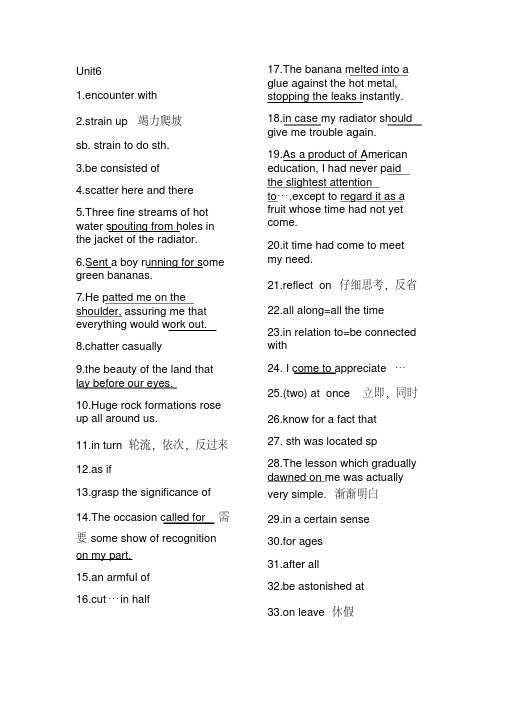
Unit61.encounter with2.strain up 竭力爬坡sb. strain to do sth.3.be consisted of4.scatter here and there5.Three fine streams of hot water spouting from holes in the jacket of the radiator.6.Sent a boy running for some green bananas.7.He patted me on the shoulder, assuring me that everything would work out.8.chatter casually9.the beauty of the land that lay before our eyes.10.Huge rock formations rose up all around us.11.in turn 轮流,依次,反过来12.as if13.grasp the significance of14.The occasion called for 需要some show of recognition on my part.15.an armful of16.cut…in half 17.The banana melted into a glue against the hot metal, stopping the leaks instantly.18.in case my radiator should give me trouble again.19.As a product of American education, I had never paid the slightest attentionto…,except to regard it as a fruit whose time had not yet come.20.it time had come to meet my need.21.reflect on 仔细思考,反省22.all along=all the time23.in relation to=be connected with24. I come to appreciate…25.(two) at once 立即,同时26.know for a fact that27. sth was located sp28.The lesson which gradually dawned on me was actually very simple. 渐渐明白29.in a certain sense30.for ages31.after all32.be astonished at33.on leave 休假Unit 81. come upon sb.2. He had his thumb out andheld a gas can in his otherhand.3. There was a time when …4. somebody in need5. With gangs, drug addicts,murderers, rapists, thieveslurking everywhere,…潜藏6. be stranded in the desert被困在7. What bothered me was that8. rely solely(=only) on9. feed/shelter sbcarry sb down the road10. intrigue sb 激起兴趣11. a cashless journeythrough the land of thealmighty dollar12. accept offers of13. conquer sth14. watch out for 戒备15. people’s readiness tohelp a stranger16. run contrary to 违反17. pull a car to the roadshoulder 18. a trucker pulled over开到路边19. lock brakes hard20. be robbed at knifepointby a hitchhiker21. invite me to a simpledinner22. be grateful to sb for sth23. as a matter of course24. pitch a tent 搭帐篷25. tell you what26. stay-at –home people27. be scheduled to28. run sb over 坑害;与…相撞;违反;不利于;偶遇29. my faith renew30. in spite of31. nip sth in the buds扼杀在萌芽中32. run for 竞选33. head for serious troubleUnit 91. on the beat 在巡逻中2. move up the avenue impressively3. empty the streets4. cast eye down/over/on5. a guardian of the peace6. keep early hours 早睡早起7. long since 很久以前8. make an appointment9. all straight(=true)10. there used to be a restaurant wherethis store stands.11. be torn down 被拆除12. Strike(struck) a match and light(lit)his cigar13. Keen eyes14. Make one’s fortune15. …have our fate worked out and ourfortunes made, whatever they weregoing to be.16. Lose/keep track of each other17. It’s worth it18. He was a kind of slow man, though,good fellow as he was.19. Compete with/against some of thesharpest brains20. Get stuck in sp 全神贯注,陷入21. I’l l be on my way.我将踏上旅途22. A fine, cold rain is falling23. foot passengers in that quarter地区hurried dismally24. fill an appointment25. still in existence 26. know of sth27. arm in arm28. outline the history of his career29. release his arm30. under arrest31. have a chat with32. somehow33. all-night lunch sounter34. turn up35. oddly set36. the wind had risen to a steady blow.37. Make a fine picture of sb38. For show39. Bring up40. Hear from41. Catch up42. Change into43. Ask for44. On earth45. throw off46. speak a word for sb47. keep in step with48. agree with 适合49. leap/jump/rise to one’s feet50. catch on明白理解Unit 101. liberate sb from2. pursue one’s hobbies3. be in pursuit of4. take satisfaction in5. give in to6. feel fulfilled by7. be empty of8. take/find pride in9. at heart本质上10. tend(=look after) sth11. Contact with12. An alternative to13. Though trail and error14. Offer a simple .butenduring satisfaction15. A metaphor for16. Take responsibility for17. Mind one’s work18. At great length=in greatdetail19. Read sth into sth认为…有言外之意20. Place an order for21. Be behind bars=be in jail22. Survive in 23. Cut out 停止,击败,中断,离开24. Bring back to healthy/life25. In some ways在某种程度上26. Provide with27. Supply with28. Remove from29. Ask for permission30. Give oneself up自首31. Give way倒塌,让路,失去控制,撤退Unit 111. gain strength2. not that 到不是说3. upset=knock over4. scatter all over the floor5. poke his face around thecorner6. quiet down7. in search of search for8. it all served to fog my mindwith pleasure.9. In sailed Mrs.Y, wild withanger10. Thrill to sth=be excitedat11. Become restless焦躁不安12. Wake up with a start惊醒13. ears pointed耳朵尖14. it was all for the best15. as busy as a squirrel16. slip into my snowshoes=put on quickly17. drift down18. the snow thickened fast19. a blanket of whitedarkness 20. only too=very21. only to do22. the storm would haveblow itself out23. be smothered by 窒息24. time/place see /witness(no end to ) sth25. slash off 削减26. blood spurted freelyfrom my wound27. the howl seemed tofreeze the world with fear28. work my way out29. take one’s toll onsb.=have a bad effect on30. for life31. leave sth undone32. come into focus33. fan it back to life34. work one’s way out ofUnit 121. help with the milking2. cling to3. the two of us4. a light sleeper5. wide/fully/half awake6. slip back in time7. hate to8. it’s time that sb did…it’s the first time that sbhave done …9. something in sb woke=sbrealize10. take sth for granted =take…as a matter ofcourse11. stumbling blind withsleep12. lay on his side侧躺13. a thought struck sb14. laugh to oneself15. gaze at16. for once17. hang up18. feel for him=try to find19. the words broke fromhim of their own will20. burst withlove/shyness/pride 21. come to think of it22. creep up to23. rush/dash into the room24. steal/sneak/slip into theroom25. worm his way throughthe crowd26. tiptoe/stumble/stagger/creep/crawl into the room 27. as long asUnit 131. have a rough idea ofbe tired of =be bored with=be fed up with2. go ashore3. as it turned out4. a certain look in his eyes5. when wine sinks, wordsswim酒后失言6. Aim at7. The mastery of8. Have no rival9. He was not at all what onewould regard as the figureof a soldier10. Think of war as11. Fulfill our justaspirations12. What if=what wouldhappen if13. Let loose a plague14. Be capable of15. Within our grasp16. If only要是…就好了17. Only if 只有18. Keep at it19. Be determined to do状态20. Be content with 满意21. Inspiration gripped him22. But for要不是23. Sth/sb appeal to sb todo/for sth24. Make an appeal for25. Get on with=continue26. Mark off27. Look close靠近28. Grip sb/grip one’sattention29. Spur on30. Call for31. Depend on32. Regard as33. Get rid of34. Carry out35. Adapt to devoted to36. Be devoted to37. Be different from。
大学英语知识点

大学英语知识点关键信息项:1、词汇:包括常用词汇、学术词汇、词汇记忆方法等。
2、语法:各类语法结构、时态、语态、从句等。
3、听力:听力技巧、常见听力场景、听力练习方法。
4、阅读:阅读技巧、不同文体的阅读策略、阅读理解练习。
5、写作:写作格式、常用句型、写作思路与逻辑。
6、口语:口语表达技巧、发音纠正、口语交流场景。
11 词汇111 常用词汇大学英语中,学生需要掌握大量的常用词汇,以满足日常交流和学习的需求。
这些词汇涵盖了生活、学习、工作等各个方面,如日常用品、人际关系、学术领域等。
112 学术词汇对于学术研究和专业学习,掌握特定的学术词汇至关重要。
这包括各学科的专业术语、学术论文中常用的词汇等。
113 词汇记忆方法为了有效地记忆词汇,学生可以采用多种方法,如联想记忆、词根词缀记忆、语境记忆等。
同时,通过阅读、听力和写作等多种方式来巩固词汇的记忆和运用。
12 语法121 各类语法结构掌握英语的语法结构是正确表达和理解的基础。
这包括句子成分、主谓宾定状补的构成和作用,以及各类短语和句型的用法。
122 时态英语中有多种时态,如一般现在时、一般过去时、现在进行时、过去进行时、现在完成时、过去完成时等。
学生需要理解每种时态的构成、用法和时间概念。
123 语态主动语态和被动语态的正确使用也是语法学习的重要内容。
了解被动语态的构成和在不同语境中的应用。
124 从句从句包括宾语从句、定语从句、状语从句等。
掌握从句的引导词、结构和用法,能够使句子表达更加丰富和准确。
13 听力131 听力技巧在听力练习中,学生需要掌握一些技巧,如提前浏览选项、抓住关键词、注意听力中的转折和强调等。
132 常见听力场景熟悉大学英语中常见的听力场景,如课堂讲座、学术报告、日常生活交流等,有助于更好地理解听力内容。
133 听力练习方法通过多听英语广播、电影、电视剧、听力练习题等方式,提高听力水平。
同时,可以进行精听和泛听的训练,以增强对不同语速和口音的适应能力。
大学英语方面知识点总结

大学英语方面知识点总结在大学英语学习中,我们需要掌握一系列的知识点,包括语法、词汇、阅读、写作、口语等多个方面。
下面将从这些方面逐一总结大学英语的相关知识点。
一、语法语法是英语学习的基础,它包括句子结构、时态、语态、语气、语态等部分,下面将逐一介绍:1. 句子结构英语句子的基本结构包括主语、谓语和宾语。
主语通常是句子的核心,是句子所要表达的主体;谓语表示主语的动作或状态;宾语是主谓的接受者。
这些构成了一个句子的基本结构,要正确运用这些结构,需要掌握一定的语法规则。
2. 时态英语时态有现在时、过去时、将来时等,每种时态都有不同的用法和表达方式。
学习时态必须要掌握好它们的用法,以便正确表达自己的意思。
3. 语态英语有主动语态和被动语态两种形式。
在使用时,要根据具体语境来选择合适的语态,以便更好的表达自己的意思。
4. 语气英语有陈述语气、疑问语气、祈使语气等不同的语气形式,要根据具体情况来选择适当的语气。
以上是语法的基本知识点,要注意,不同语言的语法规则可能会有所不同,所以在学习英语的语法时,要多加练习,以便更好地掌握它。
二、词汇词汇是语言的载体,是表达意思的基本单位。
在大学英语学习中,我们需要大量的词汇来丰富自己的表达能力。
下面是一些词汇方面的知识点:1. 词汇量词汇量是英语学习的基础,要多记背单词,积累词汇量。
2. 词义辨析英语中有很多近义词和同义词,要注意它们的区别和用法,以免用词不当。
不同词汇之间有不同的搭配规律,要了解词汇的搭配用法。
4. 词根词缀英语中许多词的形成和构词法与词根和词缀有关,要学会分辨和理解它们的意义。
以上是词汇的基本知识点,要多加积累和练习,以便更好地掌握和运用它们。
三、阅读阅读是英语学习的重要部分,通过阅读可以扩展词汇,了解文化和习惯,并提高语感和表达能力。
下面是一些阅读方面的知识点:1. 阅读技巧阅读时要掌握一些技巧,如扫读、略读、细读等,以便更好地理解文章和提高阅读速度。
大学英语大一重要知识点

大学英语大一重要知识点一、词汇与语法知识1. 时态与语态在英语中,时态和语态是非常基础且重要的知识点。
时态包括过去、现在和将来三种基本时态,以及其对应的进行时态、完成时态和完成进行时态。
语态则包括主动语态和被动语态,通过语态的变化,可以使句子的表达更加灵活准确。
2. 名词与代词名词是指人、事、物和抽象概念的名称,是构成句子主要成分的一种词类。
代词则是用来代替名词的词,可以使句子更加简洁明了。
3. 动词与动词时态动词是表示动作、状态或存在的词类。
了解动词时态能够帮助学生正确使用各种动词形式,包括一般现在时、一般过去时、一般将来时、现在进行时、过去进行时、将来进行时、现在完成时等。
4. 形容词与副词形容词用来修饰名词,描述事物特征或属性;副词则用来修饰动词、形容词或其他副词,表示方式、程度等。
5. 介词与冠词介词用来表示名词与其他词之间的关系,冠词用来限定或指示名词的范围。
二、阅读理解与写作技巧1. 阅读理解阅读理解是指通过阅读理解文章,获取相关信息,理解文章主旨和细节,并进行全面准确的解读和理解。
大一学生需要通过大量的阅读练习来提高阅读理解能力。
2. 写作技巧写作技巧包括写作结构、段落发展、语言表达等方面。
在写作过程中,要合理组织文章结构,使用恰当的连接词、句子和段落过渡词,用准确丰富的词汇和句式表达思想。
三、口语表达与听力技巧1. 口语表达通过口语练习,提高口语表达能力是大学英语大一的重要任务之一。
学生可以多参加口语交流活动,积极练习口语表达,提高语感,并注意语音语调的准确运用。
2. 听力技巧听力是英语学习的重要组成部分。
大一学生需要通过大量听力材料的听取和理解,提高听力技巧和听力水平。
可以使用一些听力技巧,如抓住关键词、注意上下文等,以提高听力效果。
四、文化与背景知识1. 英美文化了解英美文化是学习英语的重要内容之一。
大一学生可以通过学习英美文化的差异和相似之处,拓宽视野,提高跨文化交际的能力。
大学英语知识点归纳

大学英语知识点归纳在大学英语学习中,同学们需要掌握一些基本的英语知识点和技巧,以便提高自己的英语水平。
本文将对大学英语学习中的一些重要知识点进行归纳总结,包括词汇、语法、阅读和写作等方面。
一、词汇1. 同义词和近义词同义词是指在含义上非常相似的词语,如big和large;近义词则是比同义词范围更广的概念,如big和huge。
同学们需要学会运用这些近义词和同义词来丰富自己的词汇量,以便更准确地表达自己的意思。
2. 词根和词缀词根是单词的核心部分,可以帮助同学们理解和记忆词汇;而词缀则是附加在词根前或后的字母或音节,可以改变词的意思。
同学们可以通过掌握常见的词根和词缀来扩大自己的词汇量。
3. 短语和习惯用语短语和习惯用语在英语交流中非常常见,掌握一些常用的短语和习惯用语可以提高同学们的口语表达能力。
同时,同学们也需要了解这些短语和习惯用语的用法和搭配,以便更加自然地运用它们。
二、语法1. 时态和语态时态是表达动作发生时间的形式,包括一般现在时、过去时、将来时等;语态是表达动作主体与被动关系的形式,包括主动语态和被动语态。
同学们需要熟练掌握各种时态和语态的构成和用法,以便在语言表达中准确传递自己的意思。
2. 从句和关系词从句是包含一个主语和谓语的句子,可以作为句子的一部分,起到修饰或补充的作用;关系词则用于连接从句和主句,如who, which, that等。
同学们需要理解和熟练运用从句和关系词,以便在写作和阅读中更好地理解和表达。
3. 并列句和复合句并列句由两个或多个等级相同的句子构成,可以用and, but等连词连接;复合句由一个主句和一个或多个从句构成,可以用关系代词或连词连接。
同学们需要学会识别并列句和复合句的结构,并能够正确地运用它们。
三、阅读1. 阅读策略阅读策略是提高阅读理解能力的有效方法,包括扫读、略读、详读等。
同学们需要根据具体情况选择不同的阅读策略,以便更好地理解文章的内容和结构。
大学英语(2)知识点总结

大学英语(2)知识点总结
大学英语(2)知识点总结:
1. 时态和语态:
- 现在时态、过去时态、将来时态、过去将来时态、现在进行
时态、过去进行时态、将来进行时态、现在完成时态、过去完成时态、将来完成时态等。
- 语态分为主动语态和被动语态,被动语态由助动词“be”加上
及物动词的过去分词构成。
2. 从句:
- 名词性从句包括主语从句、宾语从句、表语从句和同位语从句。
- 定语从句用来修饰名词,关系代词或关系副词引导。
- 状语从句用来修饰整个句子,包括条件状语从句、时间状语
从句、原因状语从句、结果状语从句、目的状语从句和方式状语从句。
3. 名词性考点:
- 可数名词和不可数名词的区别,单数名词和复数名词的变化。
- 名词的所有格形式。
- 特殊名词的复数形式。
4. 动词的时态和语态:
- 动词的各种时态和语态形式的构成,包括动词的各种形式的
变化规则和非谓语动词的用法。
5. 形容词和副词:
- 形容词的比较级和最高级形式,以及有规则和不规则变化。
- 副词的比较级和最高级形式。
6. 介词:
- 常用介词的用法和搭配,包括介词短语在句子中的位置和用法。
7. 连词:
- 并列连词的用法,包括并列关系的句子和拼接句子。
- 从属连词的用法,引导从句和连接主句和从句。
8. 句型结构:
- 祈使句、陈述句、疑问句和感叹句的语法结构和用法。
- 条件句、间接引语和宾语从句的语法结构和用法。
大一大学英语重点知识点
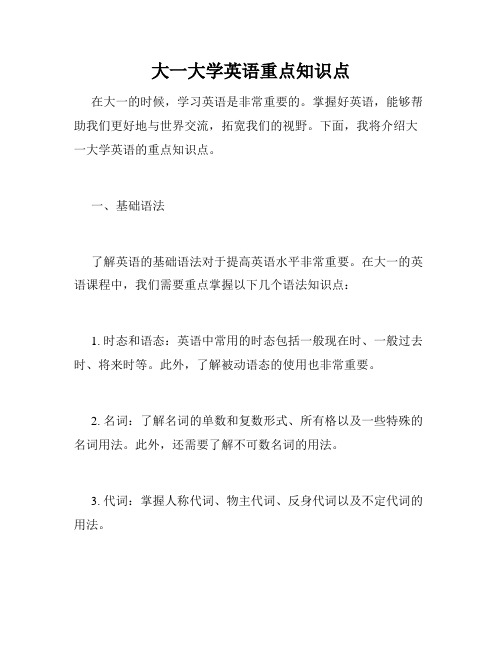
大一大学英语重点知识点在大一的时候,学习英语是非常重要的。
掌握好英语,能够帮助我们更好地与世界交流,拓宽我们的视野。
下面,我将介绍大一大学英语的重点知识点。
一、基础语法了解英语的基础语法对于提高英语水平非常重要。
在大一的英语课程中,我们需要重点掌握以下几个语法知识点:1. 时态和语态:英语中常用的时态包括一般现在时、一般过去时、将来时等。
此外,了解被动语态的使用也非常重要。
2. 名词:了解名词的单数和复数形式、所有格以及一些特殊的名词用法。
此外,还需要了解不可数名词的用法。
3. 代词:掌握人称代词、物主代词、反身代词以及不定代词的用法。
4. 形容词和副词:学会形容词和副词的比较级和最高级形式,以及一些常用的词汇和表达方式。
二、阅读理解阅读理解是大学英语课程中的重要部分。
在大一的时候,我们需要学会如何通过阅读去理解一段英文内容。
1. 找出主题句:首先要找到一段文章的主题句,这样有助于我们理解整个文章的大意。
2. 理解关键词:在阅读过程中,我们需要注意一些关键词,这些词在文章中往往起到了连接和重要提示的作用。
3. 掌握上下文推断:通过上下文可以推断出一些单词的含义,这对于我们理解整个文章非常有帮助。
4. 练习速度和准确度:阅读理解不仅要求我们准确理解文章的意思,还要求我们能够在一定时间内完成阅读。
所以,我们需要通过练习提高自己的阅读速度和准确度。
三、听力技巧掌握听力技巧可以帮助我们更好地理解英语的口语表达。
1. 抓住重点信息:在听力过程中,我们需要抓住关键信息,不要被细节和无关信息分散注意力。
2. 听取上下文线索:上下文线索可以帮助我们理解和推测讲话者的意思。
3. 提高听力速度:通过多听英语材料,可以提高我们的听力速度和理解能力。
四、口语表达大一的英语课程也会涉及到口语表达的训练。
在口语表达过程中,我们需要注意以下几点:1. 学会正确发音:掌握英语音标和发音规则,提高自己的语音和语调。
2. 多说多练:通过多与他人交流并锻炼口语表达能力。
大一英语期末考试必背知识点

大一英语期末考试必背知识点在大学英语学习中,期末考试无疑是一个非常关键的环节。
为了在期末考试中取得好成绩,学生们需要对一些重要的知识点进行重点复习和积累。
本文将为大家总结一些大一英语期末考试必背的知识点,希望能帮助大家在考试中取得好成绩。
一、语法知识点1. 时态和语态:掌握各种时态的用法和相应的语态转换规则,例如一般现在时、过去进行时、将来完成时等等。
同时也需要熟悉被动语态的构成和用法。
2. 从句:掌握主从复合句中各种从句的引导词和连接词的用法,如名词性从句、定语从句、状语从句等等。
3. 介词和介词短语:熟悉各种介词的用法和常见的介词短语搭配,例如表示时间、地点、原因、方式等。
4. 动词时态和语气的一致性:掌握在复合句中动词时态和语气的一致性原则,避免在句子中出现时态和语气不一致的错误。
二、词汇知识点1. 常见词汇固定搭配:复习各种常见的固定搭配,例如“take an exam”、“do homework”、“make a decision”等等。
2. 词义辨析:掌握一些近义词的区别和用法,例如“learn”和“study”、“buy”和“purchase”等等。
3. 常见短语和习惯用语:积累一些常见的短语和习惯用语,提高语言的地道性和流利度。
4. 同义词和反义词:熟悉各种同义词和反义词,增加自己的词汇量和表达能力。
三、阅读技巧1. 快速阅读:学会使用快速阅读的技巧,例如扫读标题、制定阅读计划和抓住关键信息等等。
2. 预测推断:通过对文章标题、首段和首句进行预测和推断,提前了解文章的大致内容和结构。
3. 上下文推测词义:学会通过上下文推测生词的词义,提高对整篇文章的理解。
4. 阅读答题技巧:掌握一些阅读答题的技巧和方法,例如定位关键词、排除干扰选项等等。
四、写作技巧1. 合理组织文章结构:学会合理组织文章结构,包括起承转合和段落的逻辑连接。
2. 使用丰富的句型和词汇:尽量使用丰富多样的句型和词汇,展示自己的语言能力和表达功底。
大一大学综合英语知识点
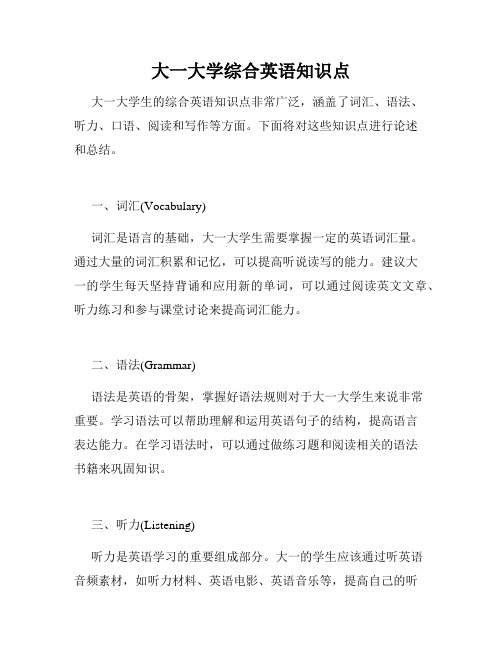
大一大学综合英语知识点大一大学生的综合英语知识点非常广泛,涵盖了词汇、语法、听力、口语、阅读和写作等方面。
下面将对这些知识点进行论述和总结。
一、词汇(Vocabulary)词汇是语言的基础,大一大学生需要掌握一定的英语词汇量。
通过大量的词汇积累和记忆,可以提高听说读写的能力。
建议大一的学生每天坚持背诵和应用新的单词,可以通过阅读英文文章、听力练习和参与课堂讨论来提高词汇能力。
二、语法(Grammar)语法是英语的骨架,掌握好语法规则对于大一大学生来说非常重要。
学习语法可以帮助理解和运用英语句子的结构,提高语言表达能力。
在学习语法时,可以通过做练习题和阅读相关的语法书籍来巩固知识。
三、听力(Listening)听力是英语学习的重要组成部分。
大一的学生应该通过听英语音频素材,如听力材料、英语电影、英语音乐等,提高自己的听力水平。
同时,可以参加听力训练班或组织听力交流活动,培养自己的听力技巧和能力。
四、口语(Speaking)口语是大一大学生英语学习的重点和难点之一。
学生应该积极参与口语练习,与同学或外教进行对话,加强口语交流能力。
此外,可以利用网络资源,如英语角、在线英语对话平台等,提高口语表达能力。
五、阅读(Reading)阅读是提高英语水平的有效途径之一。
学生可以阅读大量的英文材料,如英文报纸、杂志、网络文章等,培养自己的阅读能力。
在阅读过程中,要有意识地学习和记忆生词,加深对文章中内容的理解。
六、写作(Writing)写作是大一大学生英语学习的重点,也是提高综合能力的关键。
学生应该积极参与写作练习,包括写作文、日记、作业和论文等。
可以通过学习写作技巧和模仿优秀的范文,提高自己的写作水平。
综上所述,大一大学英语综合知识点包括词汇、语法、听力、口语、阅读和写作等方面。
学生应该注重练习和应用,通过不断地积累和提高,提升自己的英语水平,为后续的学习和工作打下良好的基础。
- 1、下载文档前请自行甄别文档内容的完整性,平台不提供额外的编辑、内容补充、找答案等附加服务。
- 2、"仅部分预览"的文档,不可在线预览部分如存在完整性等问题,可反馈申请退款(可完整预览的文档不适用该条件!)。
- 3、如文档侵犯您的权益,请联系客服反馈,我们会尽快为您处理(人工客服工作时间:9:00-18:30)。
•
Some people are complaining that
car insurance premiums have increased too much this year.
Changes in the Way We Live
• 8. dine out: eat a meal away from home (usu. in a restaurant)
•
Space technology has generated
thousands of products for everyday use
such as lightweight materials in running
shoes.
Changes in the Way We Live
• 7. premium: a sum of money that you pay
•
It is a little bit difficult for the old couple to
get by on such a small pension.
•
We can get by with four computers at the
moment, but we'll need a couple more when the
•
Rescue workers hauled passengers out
of the crashed train.
Changes in the Way We Live
• 3. pursue: follow
• e.g: After graduation Martin chose to pursue the same career as his father as a minister.
• 6. generate: bring into existence, produce
• e.g: The widespread use of Spanish in some American cities has generated a public debate over language use in the country.
spare time.
Changes in the Way We Live
• 4. get through: come successfully to the end
• e.g: The local government has taken some measures to ensure that all the people will get through the winter.
• 10. temptation: the feeling of being tempted to do sth. that you know might be wrong or harmful; the thing you want to have (uncount or count)
• e.g: Let me use another example to illustrate this difficult point.
• The editor has illustrated the book with black-and-white photographs.
Changes in the Way We Live
•
She got through the entrance
examination and was accepted by the
college.
Changes in the Way We Live
• 5. illustrate: provide with visual features; clarify by use of example, etc.
regularly to an insurance company for an insurance policy
• e.g: The employers make the employees pay for a large portion of their
health insurance premium.
Changes in the Way We Live
• P1
• 1. get by: be good enough but not very good; manage to live or do things in a satisfactory way
• e.g:My parents managed to get by on a small amount of money.
•
College students are advised to pursue a
wide range of subjects.
•
Public evening classes allow people to
earn a living during the day and pursue
vocational and intellectual interests in their
• e.g: With the improvement of living standards, more people dine out at weekends.
•
It's my daughter's birthday today, so
we're dining out tonight.
Changes in the Way We Live
new staff members arrive.
Changes in the Way We Live
• haul: 1) transport, as with a truck, cart, etc.
• e.g: The farmers haul vegetables to the market on a truck every morning.
•
The rescue team hauled medical supplies
and food to the flooded villages.
•
2) pull or drag sth. with effort or force
• e.g: A carne had to be used to haul the car out of the stream.
